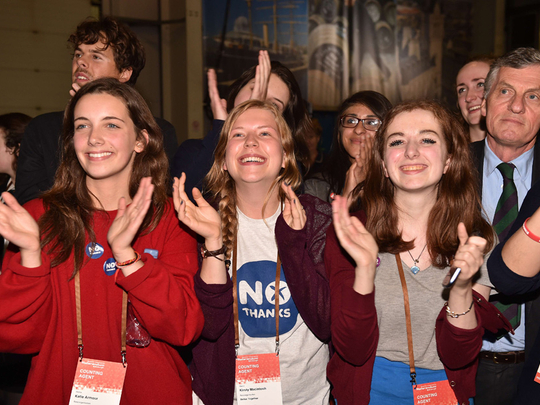
The union is saved. Alex Salmond, Scotland’s nationalist First Minister, has resigned. All the ink spilled on the benefits and costs of an independent Scotland can be consigned to counterfactual history. The only pressing question is the significance — and consequences — of the ‘No’ vote.
Most commentary has been focused on United Kingdom politics. This is too parochial. The real significance of the ‘No’ lies at European level. The result dents the hopes of other separatist movements in Spain, Italy and Belgium. The less obvious point is that we have witnessed another defeat for populism at the hands of the emergent Europe-wide grand coalition. The ‘Yes’ campaign was more than just the Scottish National Party (SNP). Its unexpected late gains in the polls reflected the mobilisation of young voters and previous non-voters, especially in the underclass of Glasgow and its environs. What attracted those people was not the rather intricate proposition of political independence plus monetary union. It was an emotional appeal, a matter of saltire flags and “wha’s like us?” rhetoric.
Populism has been popping up all over Europe since the financial crisis. England’s version is the UK Independence Party (Ukip). Last Sunday, the anti-immigrant Sweden Democrats doubled their share in the national parliament, while the anti-European Alternative for Germany party won seats in two more regional parliaments. In France, opinion polls suggest that the National Front’s Marine Le Pen has a serious shot at the presidency in 2017. The Dutch have Geert Wilders. Greece has Golden Dawn. What all these different populists have in common is nationalism — along with a rather fishy admiration for Vladimir Putin, the Russian President and a model for the chauvinism-plus-authoritarianism combination that is the essence of populism in power.
With most of the continent still struggling to return to growth and the true character of Russian power in full view in Ukraine, populism is a problem Europe really could do without. To prevent the kind of irreversible mistake that Scotland has avoided, mainstream parties across the European Union (EU) need to join forces.
In Britain, Prime Minister David Cameron has been under pressure to address the challenge posed by Ukip by moving to the right. Yet, it was his joint effort with his predecessor as prime minister, Gordon Brown, that halted the SNP. The union was saved by a coalition government in a temporary coalition with Labour.
Populism is back; it is not about to go away. The wrong response is for mainstream parties to pander to the populists. Bi-partisanship is something Americans believe in but do not practise. In Europe, the opposite applies: Coalitions across the left-right divide are unloved but increasingly ubiquitous. No fewer than 25 of the EU’s 28 member states are ruled by coalition governments.
The trend is even more evident in Brussels. Witness the recent distribution of the EU’s top jobs: The president-elect of the European Commission hails from the conservative EPP, while the president of the European Parliament is from the socialist PES. The proposed new commission includes representatives from all four of the mainstream European parties. The populists are out.
Grand coalitions used to be viewed as temporary expedients. When Germany’s Christian Democrats and Social Democrats joined forces for the first time in 1966, commentators feared it would lead to political instability. In fact, grand coalitions have turned out to bring stability. Would Germany, for instance, be better off with the alternative coalition of Social Democrats, Greens and the ex-communist Linke — which last year proposed to raise the top income tax bracket to 100 per cent?
In 2012, in the depths of the Eurozone crisis, Greek voters were twice called to the ballot to decide between two mainstream parties and a multitude of populists ranging from neo-Nazis to Communists. When no party emerged with an outright majority, the two mainstream parties put aside four decades of animosity and formed a coalition under Antonis Samaras. This decision surely averted what would have been a disastrous exit from Europe’s monetary union.
In France, too, the prospect of a National Front victory in the 2017 presidential elections will ultimately force another pacte républicain: A commitment by the parties of both the centre-left and the centre-right to join forces against Pen, regardless of which candidate ends up against her in the second round.
Populism is back and the right response is for the centrists to join forces, hard though it is to bury their ancestral rivalries. I have long been identified with conservatism, though on many issues I am in fact a liberal. The advent of a new era of grand coalitions is good news for me. From now on, I no longer need to deny my allegiance to the extreme centre.
— Financial Times
Niall Ferguson is Laurence A. Tisch Professor of History at Harvard University. This article was co-authored with Dimitris Valatsas.











